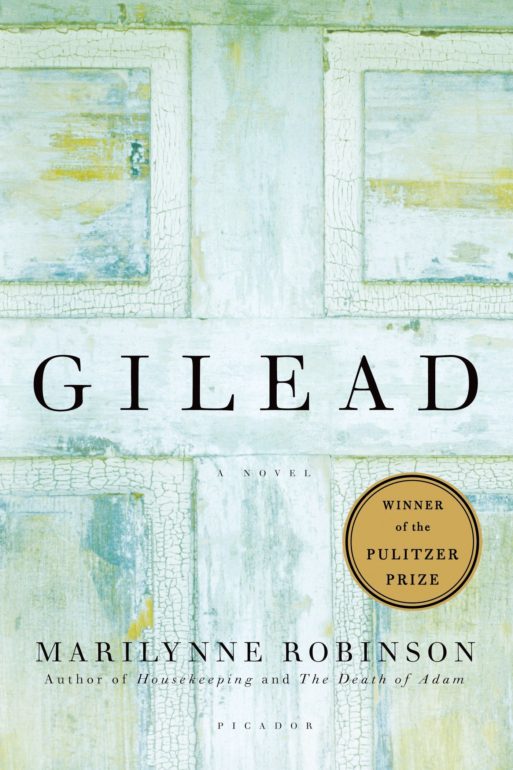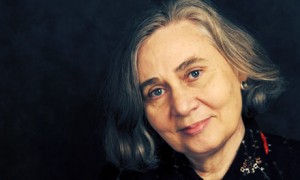 There’s too much to praise in Marilynne Robinson’s Pulitzer Prize-winning Gilead. Such luminous beauty and spiritual verve, as always sought but rarely seen, rewards the reader who opens this story based in Gilead, a small, fictional town in Iowa. A novel about aging, Christianity, genealogy, beauty and the unsolvable mysteries of life, Robinson’s masterpiece presents a bracing and tender glimpse of the last years leading up to the end of life. And it does so through the most natural, lucid prose imaginable.
There’s too much to praise in Marilynne Robinson’s Pulitzer Prize-winning Gilead. Such luminous beauty and spiritual verve, as always sought but rarely seen, rewards the reader who opens this story based in Gilead, a small, fictional town in Iowa. A novel about aging, Christianity, genealogy, beauty and the unsolvable mysteries of life, Robinson’s masterpiece presents a bracing and tender glimpse of the last years leading up to the end of life. And it does so through the most natural, lucid prose imaginable.
The story is told from the perspective of a Baptist reverend in his seventies that has heart problems. It is a collection of memories, musing and meditations directed to his ten year old son. His motivation for writing stems from a fear that he will not be able to impart his wisdom and genealogy upon the ten year old boy before his end of life. He relates the histories of his forebears along with the histories of his father and grandfather, who were also both preachers. As the dying father preserves these stories, he writes also on the experience of aging, of wondering about Paradise, and of what it will mean to leave his family with little inheritance. Beneath his tenderness and wonderment lies the practical fear of leaving behind an insufficient legacy, which this book undoubtedly fulfills.
Such luminous beauty and spiritual verve, as always sought but rarely seen, rewards the reader who opens this story based in Gilead, a small, fictional town in Iowa.
The preacher’s own major accomplishment in this extended letter is the summation of a life’s work. He records his final thoughts on faith, grace, love, forgiveness, beauty and sin—concepts he has thought about over a lifetime of reading and preaching. Robinson makes us wonder if she hasn’t somehow lived this life herself.
For the unbeliever, don’t let the book’s piety ward you off. Hardly the evangelical fundamentalist, the old man evinces a compassion and love that transcends Christianity. Faith is by no means a prerequisite for enjoying this book. Religion is merely a lesson through which the author magnifies the entire human experience. Wherever the writing feels overly didactic—wherever it seems like Robinson’s musings stray from the story itself—realize that “final thoughts” is, in fact, misleading. The point is to work through these concepts continually, to keep them alive: “To conclude,” says the narrator during a discussion on predestination, “is not in the nature of the enterprise” (152). What seems like a prescription is merely an attempt to conceptualize an ultimately unknowable truth: God himself.
He records his final thoughts on faith, grace, love, forgiveness, beauty and sin—concepts he has thought about over a lifetime of reading and preaching. Robinson makes us wonder if she hasn’t somehow lived this life herself.
Even where the book does become more intellectual, the speaker’s voice remains down-to-earth and relatable. After all, we must remember, as the author has in every sentence, that this character has spent a lifetime elucidating difficult religious problems for the common churchgoer. We are left with such radiant gems as these:
“You can know a thing to death and be for all purposes completely ignorant of it. A man can know his father, or his son, and there might still be nothing between them but loyalty and love and mutual incomprehension” (3).
“As you read this, I hope you will understand that when I speak of the long night that preceded these days of my happiness, I do not remember grief and loneliness so much as I do peace and comfort—grief, but never without comfort; loneliness, but never without peace. Almost never” (71).
“There are two occasions when the sacred beauty of Creation becomes dazzlingly apparent, and they occur together. One is when we feel our mortal insufficiency to the world, and the other is when we feel the world’s mortal insufficiency to us” (245).
Beyond these flashes of wisdom, the narrator conveys an acute sensibility that is tuned to images of unforgettable beauty. Rays of light, iridescent bubbles and sparkling splashes of water comprise a few of the images that stir his imagination. The narrator’s perspective presents a mostly benevolent, mostly good world that is no less mysterious, even at the end of life.
What seems like a prescription is merely an attempt to conceptualize an ultimately unknowable truth: God himself.
The novel is an indispensible guide to questions concerning the end of life. It also helps one reawaken a vision of the world enlightened by a spiritual perspective, regardless of what your denomination may be. With death approaching, the novel’s emphasis is on life itself, which, as the narrator reminds us, is precious and holy. A rare gift, Gilead promises to illuminate the reader with an awareness of the miracles of our everyday lives.
More from Lending Insight:
- Voices Summoned from the Pandemic in Kyrie
- Film Review: “Harold and Maude” (1971) by Hal Ashby
- A Shrine for the Lost in The Man with Night Sweats

 Gilead by Marilynne Robinson
Gilead by Marilynne Robinson



 Our Monthly Tip: Make an “In Case of Death” File to Ease Loved One’s Grief
Our Monthly Tip: Make an “In Case of Death” File to Ease Loved One’s Grief
 Passing of Beloved Comedian Births a New Comedy Festival
Passing of Beloved Comedian Births a New Comedy Festival















